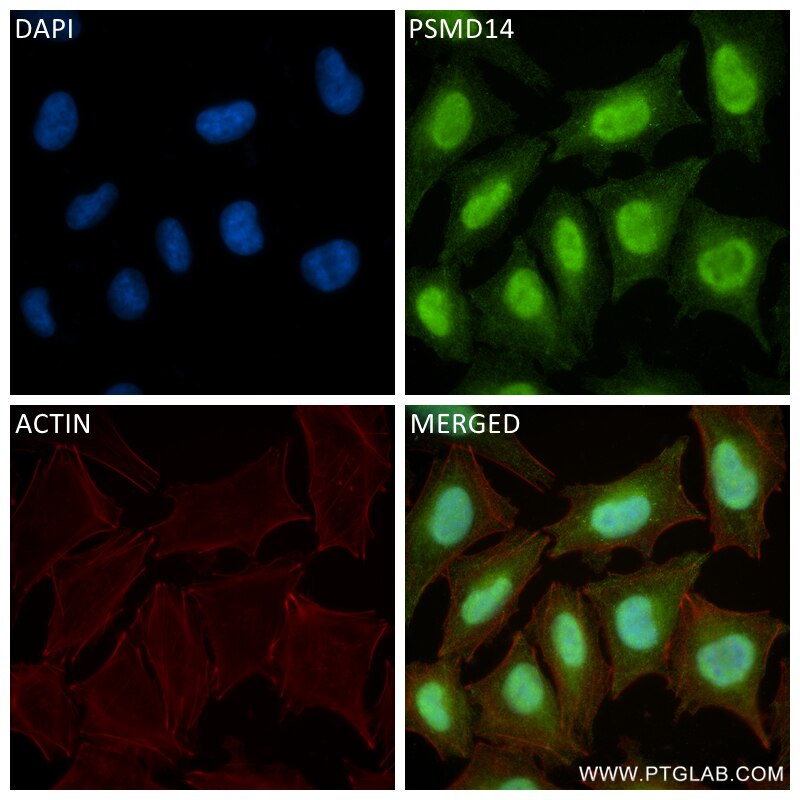PSMD14/POH1 Rekombinanter Antikörper
PSMD14/POH1 Rekombinant Antikörper für IF/ICC, ELISA
Wirt / Isotyp
Kaninchen / IgG
Getestete Reaktivität
human
Anwendung
IF/ICC, ELISA
Konjugation
Unkonjugiert
CloneNo.
242160H6
Kat-Nr. : 84767-4-RR
Synonyme
Geprüfte Anwendungen
| Erfolgreiche Detektion in IF/ICC | A375-Zellen |
Empfohlene Verdünnung
| Anwendung | Verdünnung |
|---|---|
| Immunfluoreszenz (IF)/ICC | IF/ICC : 1:125-1:500 |
| It is recommended that this reagent should be titrated in each testing system to obtain optimal results. | |
| Sample-dependent, check data in validation data gallery | |
Produktinformation
84767-4-RR bindet in IF/ICC, ELISA PSMD14/POH1 und zeigt Reaktivität mit human
| Getestete Reaktivität | human |
| Wirt / Isotyp | Kaninchen / IgG |
| Klonalität | Rekombinant |
| Typ | Antikörper |
| Immunogen | PSMD14/POH1 fusion protein Ag2694 |
| Vollständiger Name | proteasome (prosome, macropain) 26S subunit, non-ATPase, 14 |
| Berechnetes Molekulargewicht | 35 kDa |
| GenBank-Zugangsnummer | BC009524 |
| Gene symbol | PSMD14 |
| Gene ID (NCBI) | 10213 |
| Konjugation | Unkonjugiert |
| Form | Liquid |
| Reinigungsmethode | Protein A purfication |
| Lagerungspuffer | PBS with 0.02% sodium azide and 50% glycerol |
| Lagerungsbedingungen | Bei -20°C lagern. Nach dem Versand ein Jahr lang stabil Aliquotieren ist bei -20oC Lagerung nicht notwendig. 20ul Größen enthalten 0,1% BSA. |
Hintergrundinformationen
The PSMD14 (POH1, also known as Rpn11/MPR1/S13/CepP1) protein is a metalloprotease component of the 26S proteasome that specifically cleaves 'Lys-63'-linked polyubiquitin chains. The 26S proteasome is involved in the ATP-dependent degradation of ubiquitinated proteins. PSMD14 is highly expressed in the heart and skeletal muscle. In carcinoma cell lines. down-regulation of PSMD14 by siRNA transfection considerably impacted cell viability, causing cell arrest in the G0-G1 phase, ultimately leading to senescence.
Protokolle
| PRODUKTSPEZIFISCHE PROTOKOLLE | |
|---|---|
| IF protocol for PSMD14/POH1 antibody 84767-4-RR | Protokoll herunterladen |
| STANDARD-PROTOKOLLE | |
|---|---|
| Klicken Sie hier, um unsere Standardprotokolle anzuzeigen |


